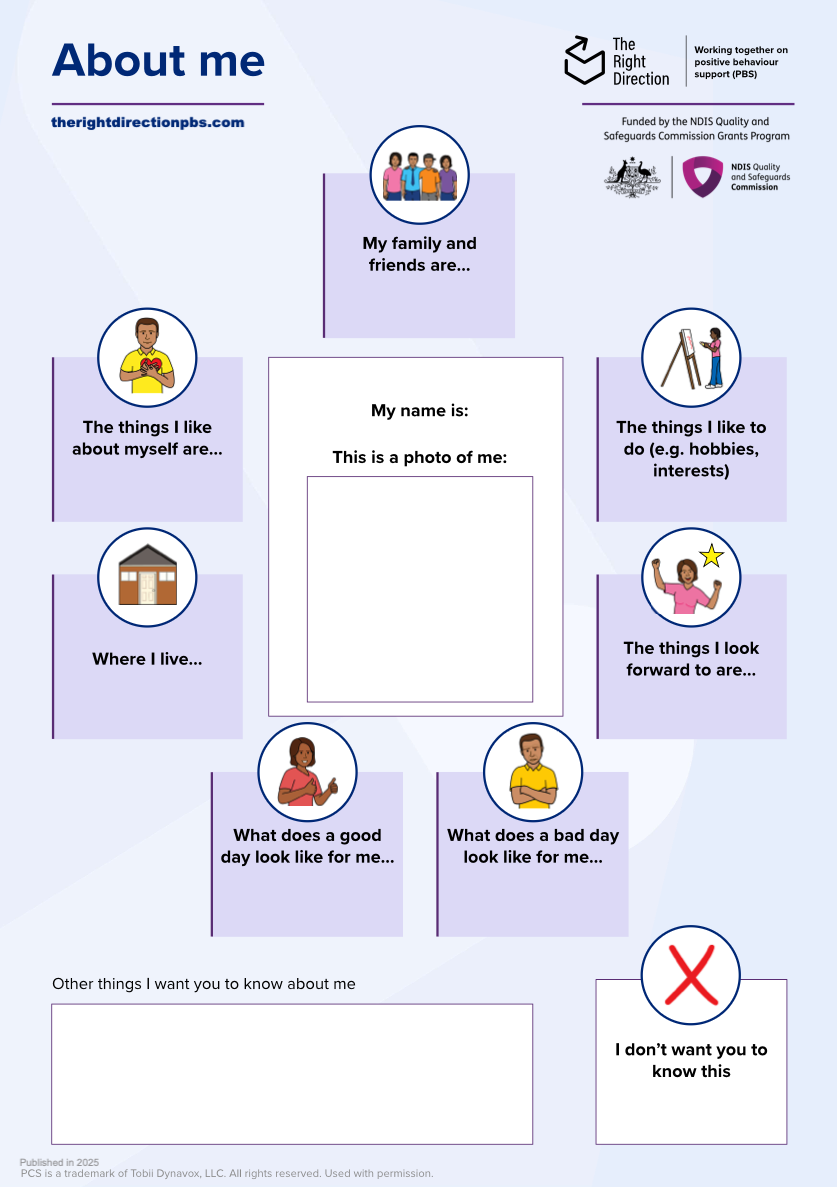Getting to know each other
Building trust and rapport: An essential step
Trust as central to successful behaviour support
As a behaviour support practitioner, building trust is a central part of ensuring a successful behaviour support process, where participants feel able to ask questions, ask for information, offer ideas and say ‘no’ – all of which uphold their rights in communicating about their behaviour support.
It's important to remember that getting to know someone is a 2-way process. You can find out more about establishing trust through practices such as Yarning and, when the time is right, progress to using The Right Direction resources designed to help you get to know each other, including:
This will help you build the foundation you need to have the open, supportive and productive conversations that underpin positive relationships between yourself, the participant and their support network. You will need these relationships to write a practical and effective behaviour support plan that genuinely improves quality of life.
This rapport also equips you to have the difficult conversations that can be required as part of the behaviour support planning and implementation process.
Using the worksheets and conversation cards
The Right Direction set of getting to know each other worksheets and conversation cards are intended to be used by behaviour support practitioners as a tool to use with participants.
Behaviour support practitioners can use one of 2 printable worksheets:
- 1)The ‘about me’ worksheet is intended for both the behaviour support practitioner and the participant to complete together.
Having separate sheets allows flexibility in terms of where you sit, enabling a more flexible approach to personal space. You can print a copy for everyone in the conversation (if others from the participant’s support network are present), if you wish. - 2)
The ‘about us’ worksheet enables the behaviour support practitioner and the participant to complete the sheet together, encouraging a collaborative approach
There are also 2 sets of conversation cards, which can be updated with images of your own, if you have some available that are specific to the participant’s life and situation.
- 3)The conversation cards (A4) are downloadable and printable, and
- 4)The customisable conversation cards (A4 - Word version for desktop) can be edited in line with your needs.
You may even wish to enter some information you already know, to show you have been listening and work together to ensure it’s correct and build on it.
These worksheets should be used as conversation starters and provide space to write key words, draw pictures or take notes.
The conversation cards provide more space, in which you can write words, draw images or insert photos in the conversation cards, either before or after printing.
Of note, the card relating to ‘I don’t want you to know this’ can be used to note down any difficult topics that the people involved don’t want to talk about. Noting down these shows that you have listened and respected each other’s decision and gives you both a reminder for your later visits.
Next steps
Also see:
- Applying principles of Yarning in behaviour support
- Talking about behaviour support in ways everyone can understand
- Engaging effectively through 2-way communication
- Communicating about behaviours of concern: Using discussion mats
- Communicating about restrictive practices
Other useful links (external sources):
- NDIS resources on Evidence-informed practice and Person-centred practice outline what is expected of NDIS providers, including: what the practices are; why they are important; how they can be implemented by NDIS providers; and where to find further information
- NDIS participant resources also include easy read versions about:
- Choosing a specialist behaviour support provider
- What to expect from your specialist behaviour support provider, and
- What to do if you are not happy with your specialist behaviour support provider
- Your Service, Your Rights: Conversation cards, by Inclusion Australia
- Deciding with Support includes further worksheets on this topic, as well as information for behaviour support practitioners about supporting participants to make their own decisions throughout the behaviour support process
- Using pictures to explore hopes and dreams, by Picture My Future

